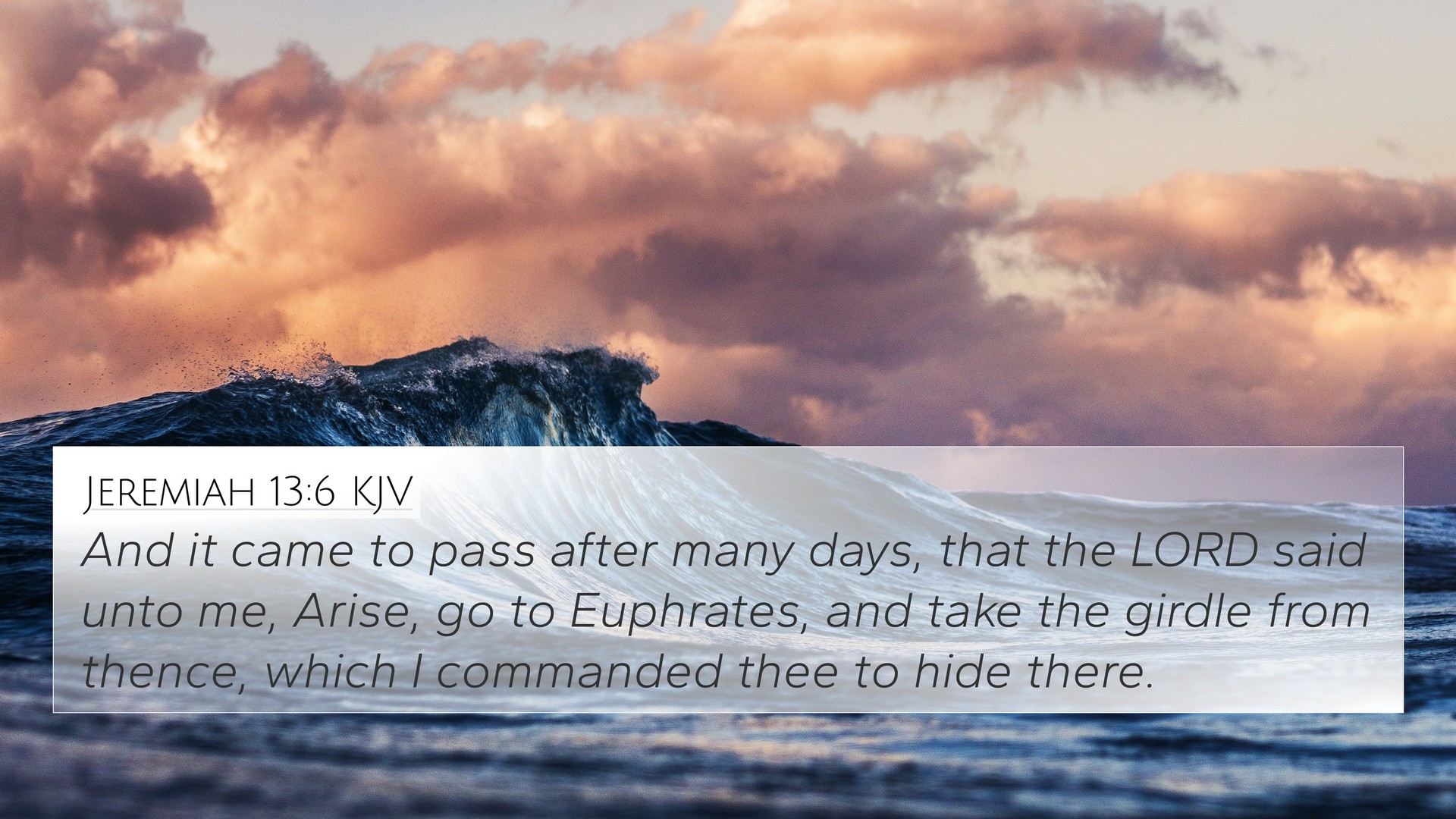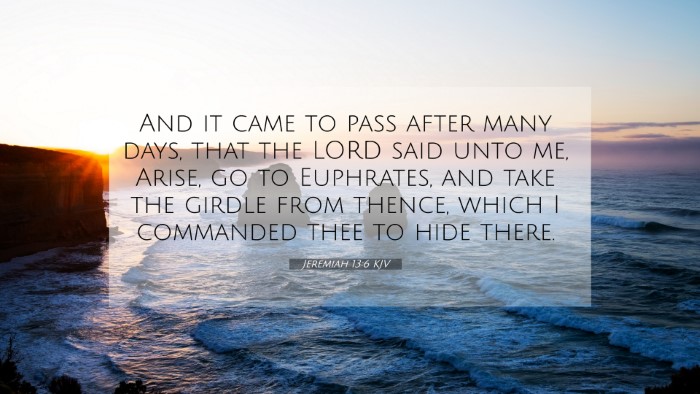Understanding Jeremiah 13:6
The verse Jeremiah 13:6 states:
"And it came to pass after many days, that the Lord said unto me, Go, get thee to the Euphrates, and hide the girdle there in a hole of the rock."
This passage holds profound significance in the context of Jeremiah's prophetic ministry. It unfolds a symbolic act that involves instruction from the Lord, manifesting the themes of judgment, obedience, and the dire consequences of Israel's disobedience.
Contextual Insights
Commentators like Matthew Henry, Albert Barnes, and Adam Clarke provide vital perspectives on this scripture:
- Matthew Henry: Emphasizes the act of burying the girdle as symbolic of Israel's pride and subsequent shame. Henry points out that the girdle, a symbol of strength and beauty, would become rotted and useless, representing the nation’s degeneration due to sin.
- Albert Barnes: Highlights the divine command to Jeremiah, insinuating that God often uses tangible symbols to communicate His messages. Barnes interprets the burial location—the Euphrates—as a metaphorical point that connects deeply to Israel's historical context and their idolatrous inclinations.
- Adam Clarke: Addresses the geographical and cultural relevance. He noted that the Euphrates was a significant river, marking the border of Israel at times and attracting idolatry. Clarke also reinforces the idea that the girdle represents the covenant between God and His people, showcasing the severe repercussions of their unfaithfulness.
Thematic Connections
Jeremiah 13:6 highlights several overarching themes within biblical literature:
- Obedience to God: Jeremiah's compliance with God's command illustrates the importance of obedience in our faith journey.
- Consequences of Sin: The decay of the girdle serves as a stark reminder of the spiritual decay that sin brings into the lives of individuals and nations.
- Symbolism in Prophecy: This act foreshadows deeper realities concerning God's relationship with His people, wherein tangible actions resonate with spiritual truths.
Bible Verse Cross-References
Understanding Jeremiah 13:6 can be enriched by cross-referencing other scripture passages:
- Isaiah 20:3: Relates to prophetic symbolism involving girdles, illustrating God's messages through prophetic acts.
- Ezekiel 12:1-3: Discusses the necessity of prophetic actions to serve as signs to Israel, echoing Jeremiah’s command to act symbolically.
- Hosea 4:6: Highlights the importance of knowledge in relationships with God, which is relevant to Hebrews 8:9 discussing covenant unfaithfulness.
- 2 Kings 17:15: References the people's idolatry and rejection of God's commandments, paralleling Jeremiah’s themes of judgment and degradation.
- Romans 11:22: Describes God's kindness and severity, resonating with the themes present in Jeremiah concerning divine judgment.
- Matthew 5:13: "You are the salt of the earth," relating to the theme of living out one’s faith authentically or facing decay.
- 1 Peter 5:6: Encourages humility before God, countering the pride represented in the Israelite disobedience exhibited in Jeremiah.
Cross-Referencing as a Study Tool
Utilizing tools for Bible cross-referencing enriches one’s study experience:
- Bible Concordance: A resourceful tool that helps locate corresponding verses based on keywords.
- Bible Cross-Reference Guide: Assists in identifying thematic and contextual links between passages.
- Cross-Reference Bible Study: A method for engaging with the text at a deeper level, understanding connections and implications.
Conclusion
Jeremiah 13:6 serves as a poignant reminder of God's unwavering message to His people through prophetic acts. The inter-biblical dialogue fostered by related scripture elevates our understanding, demonstrating how biblical texts connect through themes of obedience, faithfulness, and divine judgment. By leveraging resources and methodologies that focus on biblical cross-referencing, readers can discern richer meanings within the scriptures, thus developing a deeper relationship with the Word of God.


